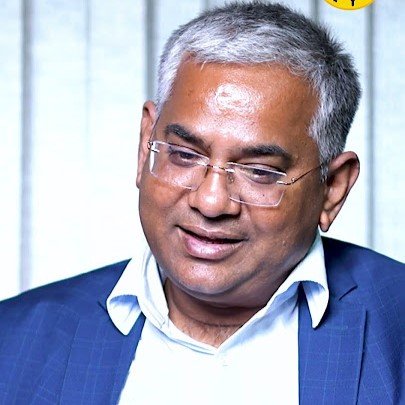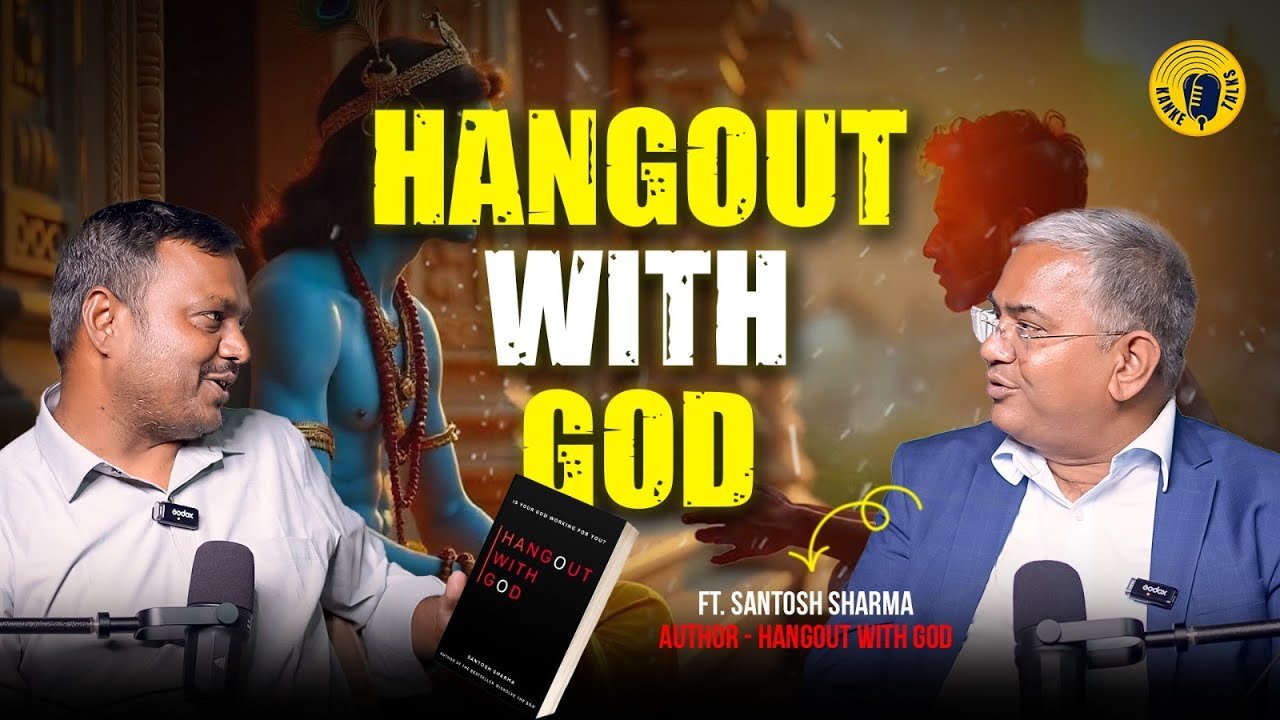In a world entangled in AI, algorithms, and constant hustle, it’s easy to forget the stillness within.
But what if God wasn’t someone we bowed to in temples or worshipped from afar?
What if He was a friend — someone to hang out with, talk to, argue with, and learn from?
That’s the radical premise of Santosh Sharma’s deeply thought-provoking book “Inspiration – Volume 1: The Voice Within.”
This is not your usual spiritual read.
It doesn’t ask you to leave your job, meditate under a tree, or chant mantras endlessly.
Instead, it asks a daring question:
Can we bring God into our daily chaos — into boardrooms, traffic jams, and even office politics?
Santosh believes not only that we can — but that we must.

From Worship to Relationship
Santosh doesn’t view God as a distant idol.
For him, God is not a noun, but a verb — a dynamic process, a creative force, an energy flow.
It’s not about going to temples; it’s about living with God every moment — in decisions, in dilemmas, and in the ordinary grind of life.
He talks about “hanging out with God,” a term that startles and comforts at once.
It suggests intimacy, ease, and daily dialogue.
As a child, Santosh wondered whether God still held a Sudarshan Chakra or was still crucified.
But adulthood brought a different revelation.
He realized that God wasn’t to be found in relics or rituals, but in the process of living fully and consciously.
The God Process: Where Science Meets Soul
In today’s era of Artificial Intelligence, Santosh boldly says:
The more AI grows, the more we’ll need to connect with God.
But not the old God of superstition and fear.
Instead, a new-age God rooted in Universal Intelligence.
This is not at odds with science — it’s aligned with it.
The ancient rishis weren’t just spiritual; they were scientists of their time,
communicating profound truths through metaphors and stories.
Just like code runs software, “The God Process” runs the universe.
This process is scientific, precise, and fair.
It’s the same force that makes trees bloom, planets spin, and humans evolve.
When we align with this process, we experience harmony, happiness, and success.
Meet the Real Villains: ELFAD
Santosh identifies five internal enemies that sabotage our connection to the God Process.
He calls them the Gang of Five: ELFAD:
- E – Ego
- L – Limited Self-Understanding
- F – Fear
- A – Attachment
- D – Dominant Mind
These villains live inside us.
Ego makes us defensive.
Fear cripples our courage.
Limited thinking stops our growth.
Attachment creates dependency.
And a dominant mind drowns out intuition and peace.
The problem, Santosh says, is not that we have these within us —
it’s that we nurture them.
We feed them with our thoughts and let them control us.
Real spirituality, therefore, is not about suppressing them,
but right-sizing them — giving them only as much space as they deserve.
From Human to Divine: Becoming the Process
In this God Process, we don’t worship God — we become God.
Not in arrogance, but in awareness.
When you follow the same path as Rama, Krishna, Jesus, or Buddha, you start embodying their principles.
But in the 21st century, you’re not expected to renounce the world or go into exile.
“Kaliyug ke Ram” isn’t someone who gives up his job;
it’s someone who balances work with inner values.
Your battles are not with Ravana, but with your own ELFAD. Exile doesn’t happen in a forest, but in the traffic of emotions and expectations. Arrows take the form of your actions. Dharma lies in your integrity.
The Startup of Spirituality
Santosh suggests treating spirituality like a startup:
Experiment. Iterate. Innovate.
He calls for a “startup in religion” —
a modern version where science and soul shake hands,
where God is less dogma and more dialogue.
He’s not trying to overthrow religion.
Instead, he urges us to upgrade it.
Religion, he says, should evolve like everything else —
more inclusive, more conscious, and more focused on transformation than tradition.
Heaven, Hell, and Karma – Redefined
Forget the flames of hell and the pearly gates of heaven.
In Santosh’s model, hell is living under the rule of ELFAD,
and heaven is the peace that comes when you dissolve them.
You don’t need to die to experience either.
You just need to live with awareness.
Similarly, karma isn’t a mystical ledger of cosmic punishment.
It’s a law of cause and effect.
Like physics, it works regardless of belief.
The ball you hit in cricket won’t land well if you swing with fear or ego.
Play it with love, and it’ll connect sweetly.
That, he says, is karma in action.
Sweet Timing: The Art of Conscious Action
Santosh draws a beautiful analogy from cricket.
When Rohit Sharma hits the ball perfectly,
it’s not just skill — it’s sweet timing.
It’s being completely present.
It’s not just reacting — it’s responding.
That’s what the God Process does —
it helps you live in sweet timing.
In your career, in your relationships, and in life —
when you’re aligned with your purpose,
when your ego and fears are not running the show,
you act from your Universal Intelligence.
That’s where real success is born.
Bringing God to the Office
Corporate cubicles are not temples, but they can still be sacred spaces.
Santosh offers real-world insights for young professionals
struggling with politics, betrayal, and burnout.
He says:
“Your boss won’t change. Your toxic colleague won’t change.
But you can change how you receive, process, and respond.”
That’s where leadership is born —
not from power, but from awareness.
When you align with the God Process,
you influence others just by your presence.
That’s not management — it’s transformation.
From ‘I’ to ‘We’: The Power of Inclusive Thinking
One of the most revolutionary shifts Santosh suggests
is moving from the ‘I’ mindset to the ‘We’ mindset.
Most of our problems — whether in politics, religion, or relationships —
come from individualism.
When we ask,
“What’s in it for me?” — we isolate.
But when we ask,
“What’s in it for us?” — we evolve.
It’s a simple idea.
But world-changing.
A Spiritual Take on Love and Relationships
Santosh even dives into modern-day love.
He says love, like God, is a process.
It’s not about fantasy or control —
it’s about growth.
Real love is not transactional.
It doesn’t say,
“If you do this, I’ll love you.”
It says,
“I love you enough to grow together.”
If your girlfriend loves someone else,
and it tears you apart ask yourself:
Was it love or ego? Was it attachment or understanding?
Love doesn’t die. Our expectations do.
AI, Consciousness, and the Future of God
What happens when AI becomes conscious?
Will it believe in God?
Santosh’s answer is poetic:
God is not a belief.
God is the algorithm running the universe.
Once AI achieves consciousness,
it won’t compete with God —
it will become a part of the God Process,
just like us.
We started as animals.
We evolved into humans.
And now, we’re on the cusp of something higher:
Human 2.0 — Conscious Creators.
Conclusion: Don’t Leave Godin the Temple
The final message?
Don’t leave God locked in temples, mosques, or churches.
Take Him with you —
into your meetings, your marriages,
your startups, your studies,
your podcasts, and your pain.
Hang out with Him.
Talk to Him.
Argue with Him.
Most importantly, walk with Him.
Because when God is no longer just worshipped,
but lived, your life transforms.
Not someday. But now.

No responses yet